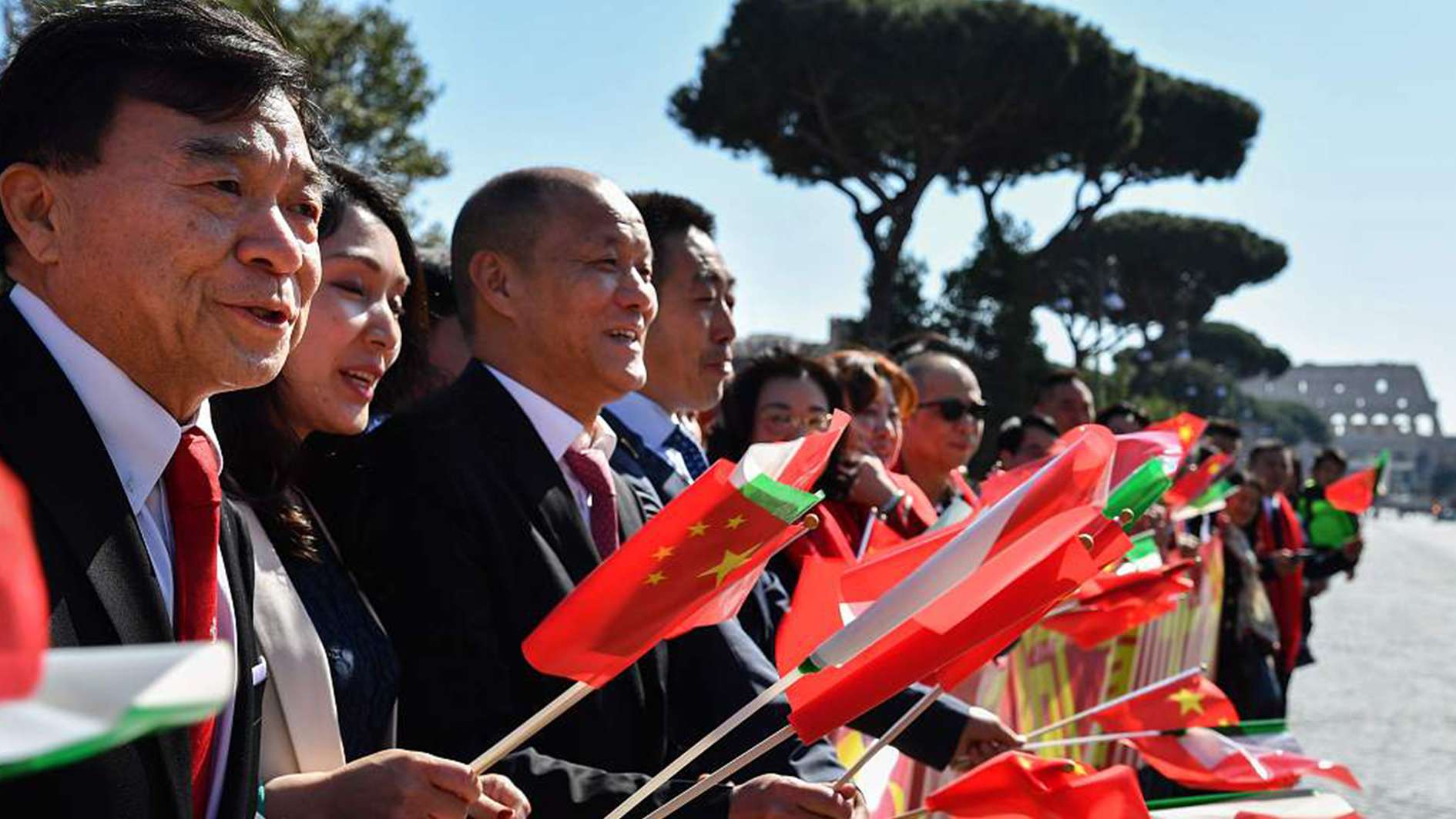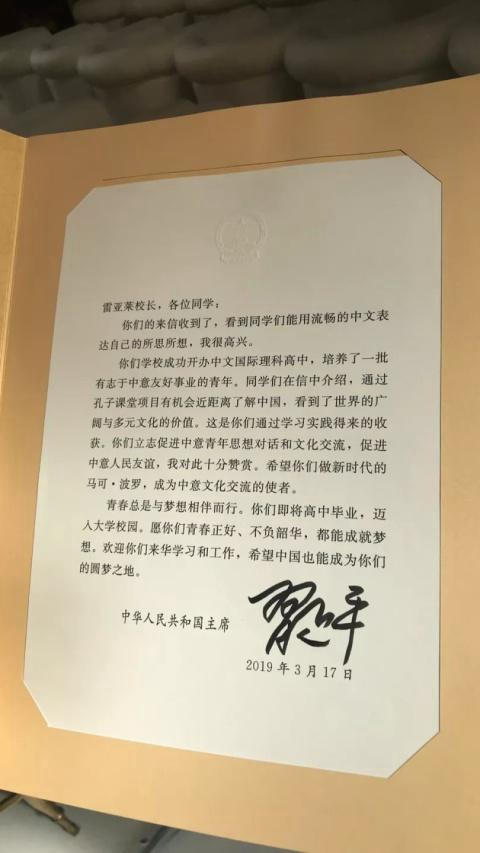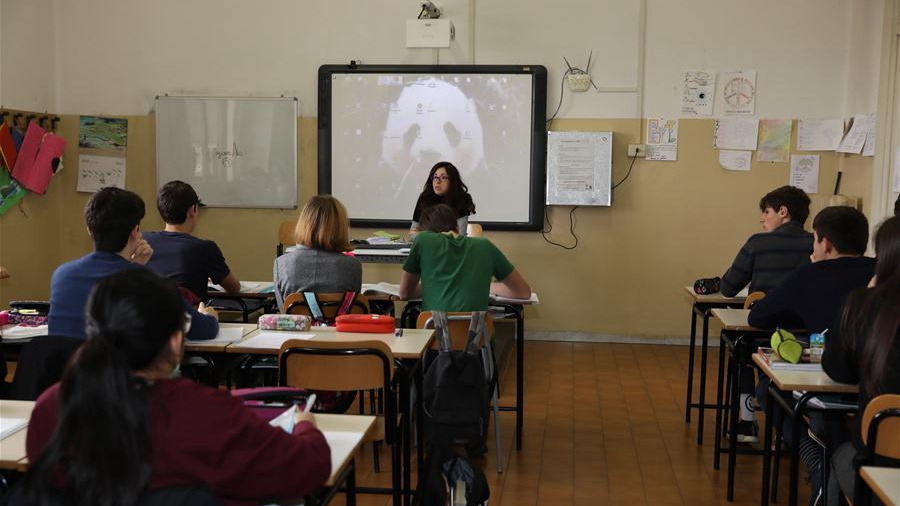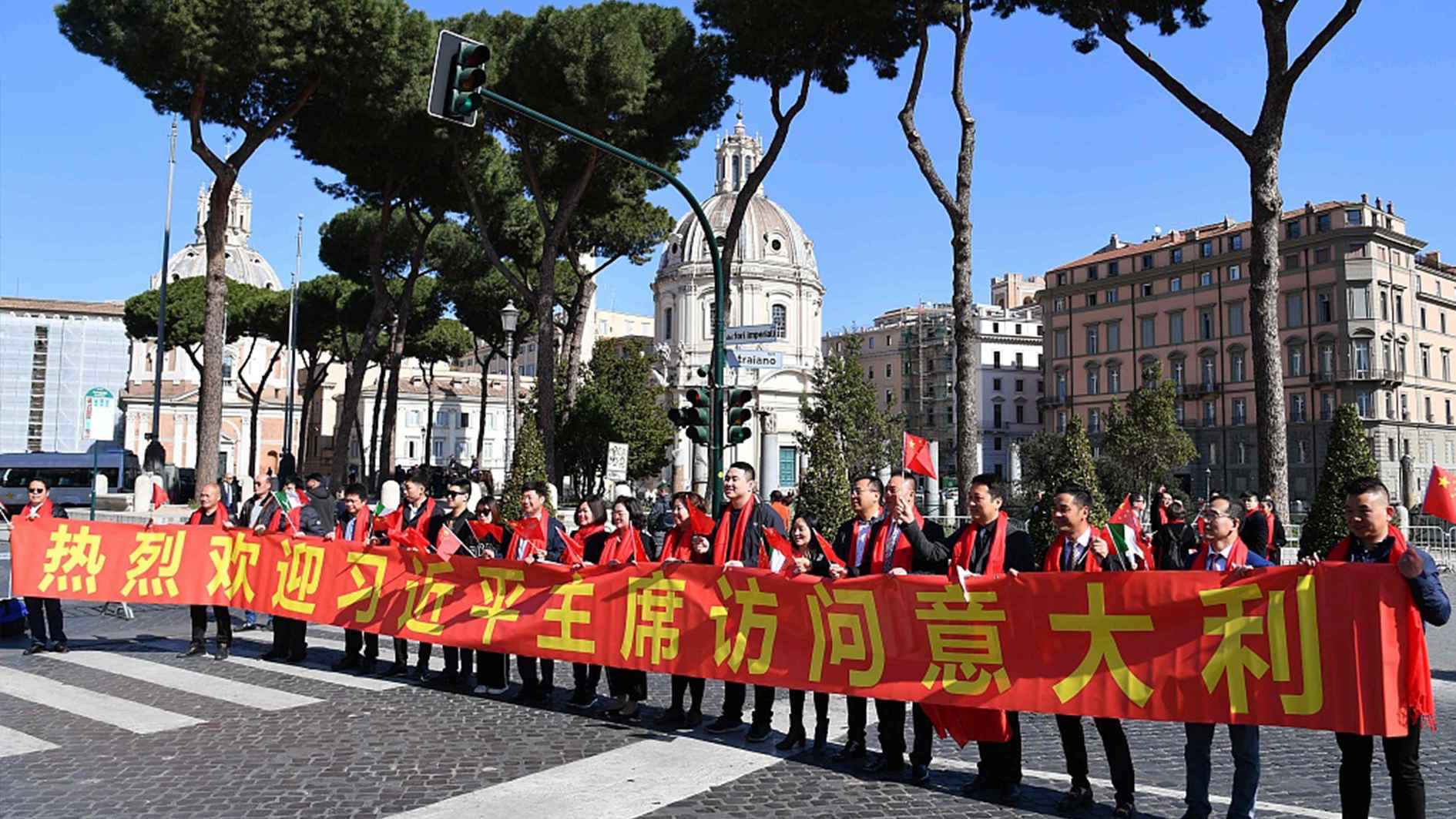
TV Show
22:28, 23-Mar-2019
Student: Chinese will be more important in Italy after Belt and Road
The Point with Liu Xin
00:59

Meet Nicolas Kovacich, one of the eight students who, together with their teacher Paolo M. Reale, wrote to Chinese President Xi ahead of his state visit to Italy.
In the letter, they conveyed their love for China and expressed their eagerness to rejuvenate the friendship between China and Italy.

President Xi's letter to Nicolas Kovacich. /CCTV Photo
President Xi's letter to Nicolas Kovacich. /CCTV Photo
In his reply, Chinese President Xi Jinping encouraged the students to be Macro Polos of the new era and act as cultural ambassadors between the two countries. He was also very pleased to see that the students could express themselves in fluent Chinese.
Nicholas' school, the Rome Convitto Nazionale Vittorio Emanuele II, is an international high school founded in 2009 that teaches science-related courses in Chinese. The school has the largest Confucius classroom in Italy. Below is a transcript of Nicholas Kovacich's interview with CGTN's Liu Xin.

Students of Rome Convitto Nazionale Vittorio Emanuele II, an Italian boarding school, have a geography lesson in Chinese in Rome, Italy, March 18, 2019. /Xinhua Photo
Students of Rome Convitto Nazionale Vittorio Emanuele II, an Italian boarding school, have a geography lesson in Chinese in Rome, Italy, March 18, 2019. /Xinhua Photo
Liu Xin: How important do you think it is for more young people in Italy to learn Chinese and find out about China?
Nicolas Kovacich: China is already really important for young people. And it's going to be more important in the future, especially after the Belt and Road project. I think exchanges between China and Italy will increase, especially exchanges on culture and the economy. I hope that young people are going to start liking this country, this culture, this amazing culture in general.
Liu Xin: Would you like to say something in Chinese?
Nicolas Kovacich: My name is Qi Yuan hang, Qi as in the word "emulate those better than oneself". Hang as in the word 'sail away'.
Liu Xin: Your name means that you want to sail far away eastward. Thank you very much, Nicolas Kovacich.
Nicolas Kovacich: Yeah, it's a name that my Chinese teacher gave to me.
03:39

Liu Xin: What were the reasons behind your parents' decision to go for a Chinese language school? or was it your personal choice?
Nicolas Kovacich: Basically, there are two main reasons. The first reason is that my mother, she speaks Chinese. She studied Chinese at her university. She studied in China for one year at Fudan university. So, she is in love in China as I am.
This is why when I was younger, I started being pretty curious about China and asking her to take me to China with her. When I was seven or eight, I went to China to visit Beijing and Shanghai. And then I fell in love with China. And I found this high school in Rome which had the study of Chinese as a curricular language. And I started to study there.
Liu Xin: So I figured that you must compare yourself with your peers, right? The majority of Italian youth who don't go to a Chinese language high school. What do you think has become different for you in your life or in your vision for the future compared to those students?
Nicolas Kovacich: Choosing to study Chinese has been like probably the most important thing in my life because it actually changed all my life and changed my view of the world, China and even my home country.
And there are still not many people studying Chinese in Italy, but this number is increasing. We were the first high school to put Chinese as a curricular language, so like as a normal class. And now many high schools are doing the same, many universities already studied Chinese and so yes, I think Chinese is going to, it has already changed my life and I hope it is going to change my future.
Liu Xin: So I understand that you and your classmates under the guidance of your teacher wrote a letter to President Xi before his visit to Italy this time. And very luckily, you got a reply from him with some very interesting messages. Why did you decide to do that? What did you tell him in the letter?
Nicolas Kovacich: Mainly for two reasons. The first reason is that we wanted to let the president know and let China know that in Italy there's such a group of people studying Chinese. Young people every day working hard in studying Chinese. And every year we go to China, so we wanted to show them our love for their country.
And for the second reason was to thank them for the occasions that they gave us, especially for all the teachers that come to Italy to help us study Chinese and for the occasion to take us in China and study there in Shanghai.
For example, I've spent six months studying in Shanghai in my fourth year and every year we go there one month to study. So it's amazing for us.
Liu Xin: Okay. Well in his letter President Xi said, I hope you will become modern-day Marco Polo as cultural ambassadors between Italy and China in this new era. Um. What does this message mean to you?
Nicolas Kovacich: The whole letter, and especially this sentence was actually really important for us, because Marco Polo for us is the symbol of what we're doing. (He's an) an important guy that wrote whatever he saw in China many, many years ago and is a symbol of Italian and Chinese union and friendship. And that is what we students are trying to do every year. And I hope in the future we're going to be the new Macro Polos.
(If you want to contribute and have specific expertise, please contact us at opinions@cgtn.com.)

SITEMAP
Copyright © 2018 CGTN. Beijing ICP prepared NO.16065310-3
Copyright © 2018 CGTN. Beijing ICP prepared NO.16065310-3